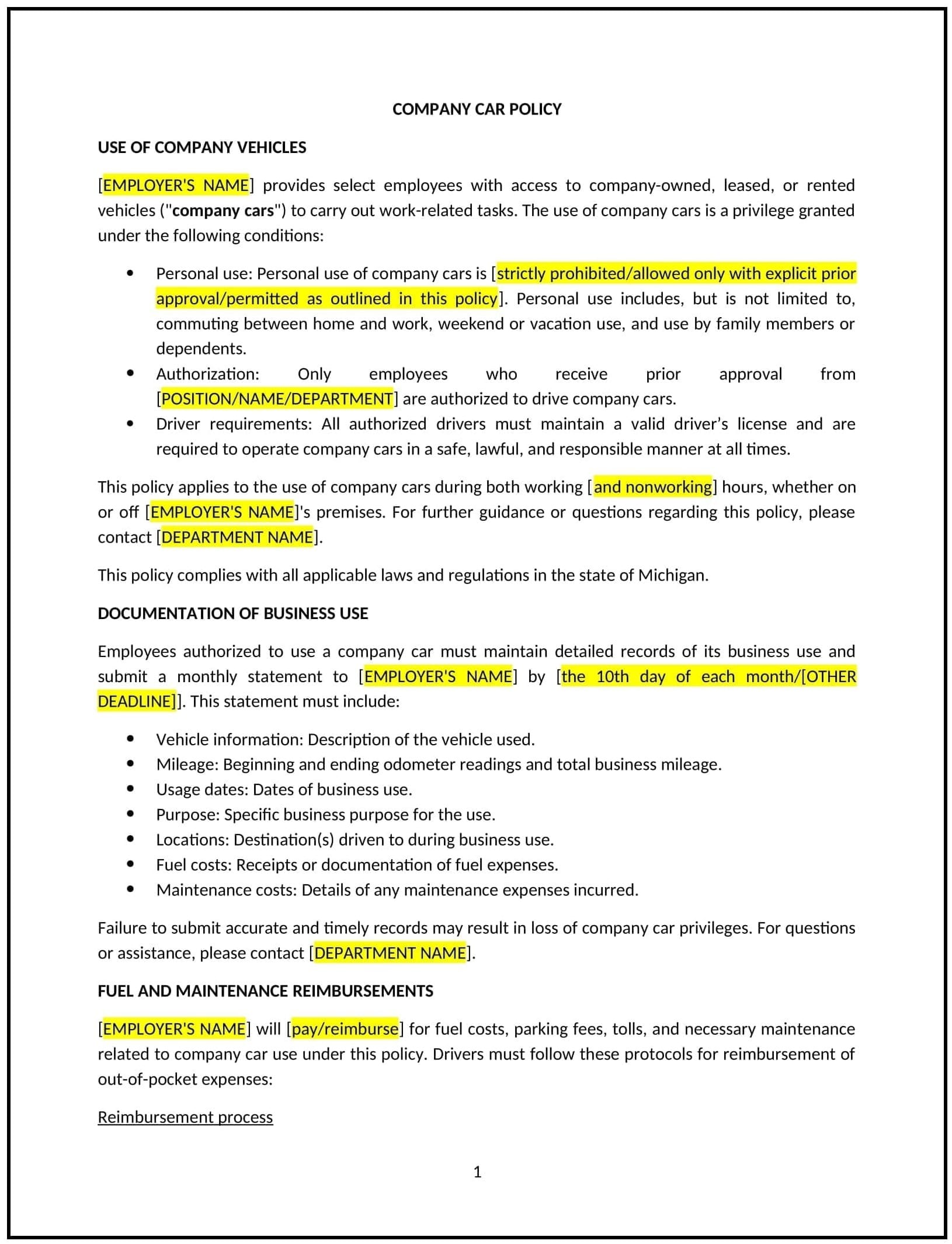Got contracts to review? While you're here for policies, let Cobrief make contract review effortless—start your free review now.

Customize this template for free
Company car policy (Michigan)
A company car policy provides Michigan businesses with guidelines for the allocation, use, and maintenance of company-owned vehicles by employees. This policy ensures that vehicles are used responsibly, protects the business’s assets, and clarifies the responsibilities of both the employer and the employee regarding the use of company cars.
By adopting this policy, businesses can enhance vehicle management, support compliance with regulations, and establish clear expectations for employees using company cars.
How to use this company car policy (Michigan)
- Define eligibility: Specify which employees are eligible for a company car, such as senior management or employees who need a vehicle for work-related travel.
- Set usage guidelines: Clearly outline the expected use of the company car, including business use only, personal use policies, and restrictions on unauthorized passengers or activities.
- Address maintenance and upkeep: Clarify the employee’s responsibility for keeping the vehicle clean and in good working condition, including regular maintenance and any required reporting of damages or issues.
- Define insurance coverage: Outline the type of insurance coverage provided by the business for the company car, including liability and collision coverage, and specify the employee’s responsibility in the event of an accident or damage.
- Specify fuel and expenses: Detail which expenses, such as fuel, tolls, and maintenance, are covered by the business and which are the responsibility of the employee.
- Provide rules for accidents: Include procedures for handling accidents, including reporting requirements, insurance claims, and any potential consequences for employees at fault.
- Set vehicle return procedures: Clearly specify the process for returning the company car when the employee leaves the business, changes roles, or when the vehicle is no longer needed.
Benefits of using this company car policy (Michigan)
This policy provides several key benefits for Michigan businesses:
- Protects assets: Helps businesses manage their vehicles effectively, reducing the risk of misuse or damage to company property.
- Promotes accountability: Sets clear expectations for employees regarding the use of company cars, ensuring responsible behavior and maintenance.
- Reduces liability: Ensures that vehicles are properly insured and employees understand their responsibility in the event of an accident or damage, reducing legal risks.
- Enhances consistency: Provides a consistent framework for vehicle use, ensuring that all employees follow the same guidelines and policies.
- Supports employee satisfaction: Offering a company car can be a valuable benefit that helps attract and retain employees, particularly those who need a vehicle for work purposes.
Tips for using this company car policy (Michigan)
- Communicate the policy: Ensure that all employees eligible for a company car are made aware of the policy and understand their responsibilities through onboarding and regular training.
- Maintain consistency in enforcement: Ensure that the policy is applied consistently to all employees, regardless of position, to avoid misunderstandings or favoritism.
- Regularly inspect vehicles: Conduct periodic inspections to ensure that company cars are being maintained properly and are in good working order.
- Track expenses: Keep detailed records of expenses related to company cars, including fuel, maintenance, and insurance, to ensure proper accounting and cost control.
- Review periodically: Update the policy regularly to reflect changes in Michigan laws, business needs, or industry standards regarding company vehicles.